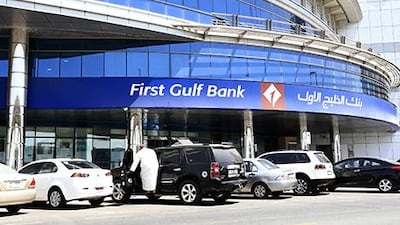First Gulf Bank has taken full control of Aseel Islamic Finance to tap rising global demand for Sharia-compliant finance.
The UAE’s second-biggest bank by market value raised its ownership from 40 per cent to 100 per cent in the unit through a purchase agreement, the bank said in a statement.
Previously Aldar Properties, Sorouh Real Estate and Reem Investments held stakes of 20 per cent each.
The deal is part of a wider strategy focused on enhancing the bank’s global presence, the statement said.
It means that Aseel effectively becomes the Islamic banking and finance arm of the bank.
“The customer-driven trend for more Sharia-compliant financing products in the UAE is clear,” said the FGB chief executive Andre Sayegh. “We have listened to our customers and our ownership of Aseel will allow us to build on our existing Islamic product portfolio to meet this growing demand.”
Javed Afzal has been appointed as chief executive of Aseel, FGB said.
Aseel plans to diversify its offering from mainly mortgage products and home financing to a broader mix including small and medium enterprises.
The seven-year-old consumer finance company has total assets of Dh1.5 billion.
The UAE is investing heavily in the booming Islamic finance industry, with several lenders seeking to expand their Sharia-compliant services.
The World Islamic Economic Forum (WIEF) opens in London on Tuesday and the UK capital, along with Kuala Lumpur, is currently the top global centre for sukuk. But Dubai is now the most serious contender for the crown of world Islamic finance leader.
This month, the Jeddah-based Islamic Development Bank (IDB) said it was considering setting up an Islamic bond issuance programme in Dubai, in what would be a boost to the emirate’s ambitions to become a global centre for Islamic business.
It would be only the third such programme from the AAA-rated IDB, an international institution which has 56 member countries and promotes economic development in Muslim countries and communities. It would be IDB’s first sukuk programme in a Middle East country.
“The size has not yet been estimated and it may take time,” Hasan Demirhan, director at the IDB’s treasury department, said of the possible Dubai programme.
“The format will be similar to the existing MTN [medium term note] format subject to the prevailing regulatory requirements.”
Local firms including Dubai Islamic Bank, Dubai’s Government, Emirates Airline and Dubai Electricity and Water Authority have raised a total of US$2.75 billion through listings on the Nasdaq Dubai and the Dubai Financial Market this year.
But IDB sukuk, which are highly sought after by Islamic investors because of their top credit rating, could boost trading volumes and – perhaps more crucially – encourage issuers from outside the emirate to choose Dubai as their listing venue.
The latest Islamic listing on the Nasdaq Dubai was Majid Al Futtaim’s US$400m sukuk last week.
That brought the nominal value of sukuk listed on Dubai’s exchanges to $11.08bn, the third largest total in the world, said Dubai Financial Market, adding that it was the sixth listing of 2013 and brought the total value of new sukuk listings in Dubai this year to $4.4bn.
“Dubai’s exchanges will continue to expand their range of Islamic finance listings and solutions, with sukuk at the forefront of development and innovation. The listing of Majid Al Futtaim’s sukuk further demonstrates the ability of Dubai’s financial markets to meet the regulatory and visibility requirements of leading multinational companies,” said Eisa Kazim, the managing director and chief executive of DFM .
business@thenational.ae

